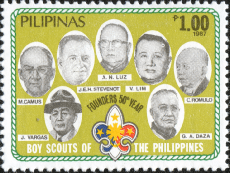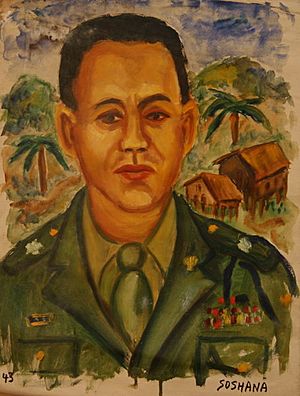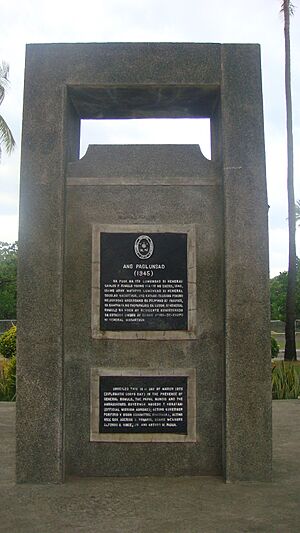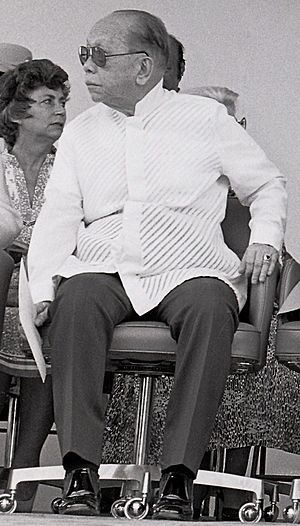Carlos P. Romulo facts for kids
Quick facts for kids
Carlos P. Romulo
QSC GCS CLH NA GCrM GCrGH KGCR
|
|
|---|---|
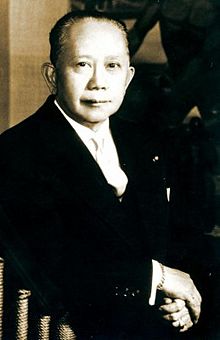
Romulo in October 1962
|
|
| President of the United Nations General Assembly | |
| In office 1949–1950 |
|
| Preceded by | Herbert Vere Evatt |
| Succeeded by | Nasrollah Entezam |
| Philippine Ambassador to the United States | |
| In office September 1955 – February 1962 |
|
| President | Ramon Magsaysay Carlos P. Garcia |
| Succeeded by | Emilio Abello |
| In office January 1952 – May 1953 |
|
| President | Elpidio Quirino |
| Preceded by | Joaquín Miguel Elizalde |
| 5th and 14th Minister of Foreign Affairs | |
| In office 1968 – January 1984 |
|
| President | Ferdinand Marcos |
| Preceded by | Narciso Ramos |
| Succeeded by | Manuel Collantes (Acting) |
| In office 1963–1964 |
|
| President | Diosdado Macapagal |
| Preceded by | Salvador P. López |
| Succeeded by | Mauro Mendez |
| In office May 11, 1950 – 1951 |
|
| President | Elpidio Quirino |
| Preceded by | Felino Neri |
| Succeeded by | Joaquín Miguel Elizalde |
| Secretary of Education | |
| In office December 30, 1965 – December 16, 1967 |
|
| President | Ferdinand Marcos |
| Preceded by | Alejandro Roces |
| Succeeded by | Onofre Corpuz (Acting) |
| Secretary of Public Instruction and Information | |
| In office October 1944 – February 1945 |
|
| President | Sergio Osmeña |
| Preceded by | Sergio Osmeña |
| Succeeded by | Maximo Kalaw |
| Member of the Interim Batasang Pambansa from Region IV-A | |
| In office June 12, 1978 – September 16, 1983 |
|
| Resident Commissioner of the Philippines | |
| In office August 10, 1944 – July 4, 1946 |
|
| Preceded by | Joaquín Miguel Elizalde |
| Succeeded by | Post abolished |
| 11th President of the University of the Philippines | |
| In office 1962–1968 |
|
| Preceded by | Vicente G. Sinco |
| Succeeded by | Salvador P. Lopez |
| Personal details | |
| Born |
Carlos Peña Romulo
January 14, 1898 Camiling, Tarlac, Captaincy General of the Philippines |
| Died | December 15, 1985 (aged 87) Manila, Philippines |
| Resting place | Libingan ng mga Bayani Metro Manila, Philippines |
| Political party | Kilusang Bagong Lipunan (1978–1985) |
| Other political affiliations |
Democratic (1953–1957) Liberal (1946–1953) Nacionalista (before 1946; 1957–1978) |
| Spouses | Virginia Llamas Beth Day |
| Relations | Alberto Romulo (nephew) Roman Romulo (grandnephew) Bernadette Romulo-Puyat (grandniece) |
| Children | 4 |
| Alma mater | University of the Philippines Manila Columbia University |
| Occupation | Diplomat, author, soldier |
| Profession | Journalist, statesman |
| Awards | Purple Heart Silver Star |
| Military service | |
| Allegiance | |
| Branch/service | Armed Forces of the Philippines (Reserve) commissioned to United States Army |
| Rank | |
| Battles/wars | World War II |
Carlos Peña Romulo Sr. (January 14, 1898 – December 15, 1985) was a famous Filipino diplomat, statesman, soldier, journalist, and author. He started his career very young, becoming a reporter at 16 and a newspaper editor by 20. He was also a co-founder of the Boy Scouts of the Philippines. Romulo served as a general in both the US Army and the Philippine Army. He also led a university and was even the president of the United Nations General Assembly.
Carlos Romulo is recognized as one of the Philippines' national artists for his writing. He received many awards and honorary degrees throughout his life.
Contents
Early Life and Career
Carlos Romulo was born in Camiling, Tarlac. He studied at the Camiling Central Elementary School. In 1923, he became an English professor at the University of the Philippines. At the same time, he worked as a secretary for Manuel Quezon, who was the president of the Philippine Senate.
In the 1930s, Romulo became the publisher and editor of The Philippines Herald newspaper. He also helped create the Boy Scouts of the Philippines (BSP). The BSP was officially formed on October 31, 1936. Romulo served as one of the organization's vice presidents.
When World War II began, Romulo, who was a major, worked as an aide to General Douglas MacArthur. He was one of the last people to leave the Philippines before US forces surrendered to the Japanese. After reaching the United States, he helped with efforts to share information about the war. He became the Secretary of Information in 1943. By the end of the war, he had become a general.
Diplomatic Work
Romulo worked for eight Philippine presidents, from Manuel L. Quezon to Ferdinand Marcos. He served as the secretary of foreign affairs for the Philippines. He was also the country's representative to the United States and the United Nations (UN). During the time the Philippines was a Commonwealth, he was a non-voting delegate to the U.S. House of Representatives. He also served as the secretary of education from 1962 to 1968.
Resident Commissioner Role
From 1944 to 1946, Romulo was the resident commissioner of the Philippines to the United States Congress. This role was for representatives from lands that were taken during the Spanish–American War. Romulo is the only person in the US Congress whose time in office ended because his country legally separated from the union.
Working with the United Nations
In his work at the UN, Romulo strongly supported human rights, freedom, and countries gaining independence. In 1948, at a UN meeting in Paris, France, he had a famous disagreement with a Soviet delegate named Andrei Vishinsky. Vishinsky tried to insult Romulo by saying, "You are just a little man from a little country." Romulo famously replied, "It is the duty of the little Davids of this world to fling the pebbles of truth in the eyes of the blustering Goliaths and force them to behave!" This left Vishinsky speechless.
President of the UN General Assembly
Romulo became the president of the UN General Assembly from 1949 to 1950. He was the first Asian person to hold this important position. He also served as president of the UN Security Council four times. Romulo had worked with General MacArthur in the Pacific during the war. He was also the first non-American to win the Pulitzer Prize in Correspondence in 1942. He won this award for his reports and predictions about events in Asia.
Running for Secretary-General
In 1953, Romulo tried to become the UN secretary-general. He did not get enough votes from the Security Council. He finished second to Lester B. Pearson of Canada. France and the Soviet Union, who had veto power, voted against him. The Security Council then chose Dag Hammarskjöld for the position.
Ambassador to the United States
Romulo served as the Philippine ambassador to the United States twice. His first term was from January 1952 to May 1953. He served again from September 1955 to February 1962.
Return to the Philippines
Presidential Ambition
Romulo returned to the Philippines and wanted to become the presidential candidate for the Liberal Party. However, he lost to the current president, Elpidio Quirino, at the party meeting. Romulo felt that he had been treated unfairly. He then left the Liberal Party. He became the campaign manager for Ramon Magsaysay, who was the candidate for the opposing Nacionalista Party. Magsaysay won the election in 1953.
Minister of Foreign Affairs
Romulo served as the Philippines' secretary (later minister) of foreign affairs under several presidents. He worked under President Elpidio Quirino (1950–1952), President Diosdado Macapagal (1963–1964), and President Ferdinand Marcos (1968–1984). In April 1955, he led the Philippine group to the Asian-African Conference in Indonesia.
Leaving the Marcos Cabinet
Romulo supported President Ferdinand Marcos for most of his time in office. However, he resigned in 1983. This was shortly after the assassination of Benigno Aquino, whom Romulo considered a friend. Romulo said he resigned because he was "heartsick" about the assassination and how it affected the Philippines' economy and reputation. His wife, Beth Day Romulo, said that the Marcos government asked him to sign an advertisement for international newspapers. Romulo refused to sign and resigned instead.
Death
Carlos Romulo passed away on December 15, 1985, in Manila, at the age of 87. He was buried in the Heroes' Cemetery (Libingan ng mga Bayani) in Metro Manila. He was remembered as "one of the truly great statesmen of the 20th century." In 1980, the UN Secretary-General Kurt Waldheim called him "Mr. United Nations" because of his important work for the UN and his dedication to freedom and world peace.
Published Books
Romulo wrote and published 22 books. Some of his well-known books include:
- The United (a novel)
- I Walked with Heroes (his autobiography)
- I Saw the Fall of the Philippines
- Mother America
- I See the Philippines Rise (these last three are about his experiences during the war)
In 1982, he was named a National Artist for Literature of the Philippines for his contributions to Philippine literature.
Honors and Awards
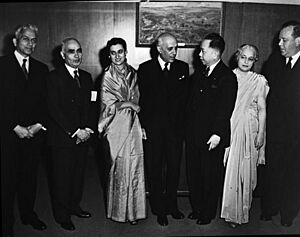
Carlos Romulo received many honors and awards throughout his life. He is one of the most decorated Filipinos in history. He was given 72 honorary degrees from different universities around the world. He also received 144 awards and decorations from other countries.
National Honors (Philippines)
 : Quezon Service Cross (1951)
: Quezon Service Cross (1951) : Grand Collar of the Order of Sikatuna (1982)
: Grand Collar of the Order of Sikatuna (1982) : Philippine Legion of Honor, Commander
: Philippine Legion of Honor, Commander : National Artist of the Philippines
: National Artist of the Philippines : Grand Cross of the Gawad Mabini (2005)
: Grand Cross of the Gawad Mabini (2005) : Grand Cross of the Order of the Golden Heart (1954)
: Grand Cross of the Order of the Golden Heart (1954) : Presidential Medal of Merit (1949)
: Presidential Medal of Merit (1949) : Order of the Knights of Rizal, Knight Grand Cross of Rizal (1961)
: Order of the Knights of Rizal, Knight Grand Cross of Rizal (1961)- Bayani ng Bagong Republika (Hero of the New Republic Award) (1984)
Military Medals (Philippines)
 : Distinguished Service Star
: Distinguished Service Star : Philippine Gold Cross
: Philippine Gold Cross : Philippine Defense Medal
: Philippine Defense Medal : Philippine Liberation Medal
: Philippine Liberation Medal
Military Medals (Foreign)
 : Commander, Legion of Merit
: Commander, Legion of Merit : Silver Star
: Silver Star : Purple Heart
: Purple Heart : Asiatic–Pacific Campaign Medal
: Asiatic–Pacific Campaign Medal
Foreign Honors
 Cuba: Grand Cross, Order of Carlos Manuel do Cespedes
Cuba: Grand Cross, Order of Carlos Manuel do Cespedes Greece:
Greece: : Grand Cross, Order of the Phoenix
: Grand Cross, Order of the Phoenix Portugal:
Portugal: : Grand Cross, Military Order of Christ
: Grand Cross, Military Order of Christ Spain:
Spain: : Knight Grand Cross, Order of Isabella the Catholic
: Knight Grand Cross, Order of Isabella the Catholic United States:
United States: : Presidential Medal of Freedom
: Presidential Medal of Freedom Taiwan:
Taiwan: : Grand Cordon, Order of Brilliant Star
: Grand Cordon, Order of Brilliant Star
Other Awards and Recognitions
- Nobel Peace Prize nomination in 1952 for his work in international cooperation.
- Boy Scouts of America Silver Buffalo Award.
- Presidential Unit Citation with Two Oak Leaf Clusters.
- Pulitzer Prize in Correspondence, 1942.
- World Government News First Annual Gold Nadal Award (1947).
- Princeton University – Woodrow Wilson Memorial Foundation Gold Medal award (1947).
- International Benjamin Franklin Society's Gold Medal (1948).
- Freeman of the City of Plymouth, England (1948).
- United Nations Peace Medal.
- World Peace Award.
- Four Freedoms Peace Award.
- Honorary Doctor of Laws degrees from Notre Dame University (1935), Georgetown University (1960), and Harvard University (1950).
Fun Stories from Beth Romulo
Carlos Romulo's wife, Beth Day Romulo, shared some fun stories about him: At a UN meeting in Paris in 1948, a Soviet official tried to insult Romulo by calling him "a little man from a little country." Romulo famously replied, "It is the duty of the little Davids of this world to fling the pebbles of truth in the eyes of the blustering Goliaths and force them to behave!"
During a meeting with Josip Broz Tito of Yugoslavia, Marshal Tito offered Romulo drinks and cigars. Romulo politely said no. Their conversation went like this:
Tito: "Do you drink?"
Romulo: "No, I don't."
Tito: "Do you smoke?"
Romulo: "No, thank you."
Tito: "What do you do then?"
Romulo: "I etcetera."
Marshal Tito found this answer very funny and repeated, "I etcetera, etcetera, etcetera!"
Romulo was a short man, barely five feet four inches tall. When he and General MacArthur landed on Leyte beach in October 1944, the news spread that MacArthur was wading in water "waist deep." One of Romulo's journalist friends joked, "If MacArthur was in water waist deep, Romulo must have drowned!"
Later, Romulo told another story about meeting MacArthur and other tall American generals. They joked about his height. Romulo replied, "Gentlemen, when you say something like that, you make me feel like a dime among nickels."
Books by Carlos P. Romulo
- I Saw the Fall of the Philippines
- My Brother Americans
- I See The Philippines Rise
- I am a Filipino
- The United
- Crusade in Asia (about the 1953 presidential election campaign of Ramón Magsaysay)
- The Meaning of Bandung
- The Magsaysay Story (with Marvin M. Gray, a biography of Ramón Magsaysay)
- I Walked with Heroes (autobiography)
- Last Man off Bataan (Romulo's experience during Japanese plane bombings)
- Romulo: A Third World Soldier at the UN
- Daughters for Sale and Other Plays
See also
 In Spanish: Carlos P. Rómulo para niños
In Spanish: Carlos P. Rómulo para niños
- List of Filipino Nobel laureates and nominees
- List of Asian Americans and Pacific Islands Americans in the United States Congress
- Resident Commissioner of the Philippines
- The Thomasites
- Philinda Rand
 | James Van Der Zee |
 | Alma Thomas |
 | Ellis Wilson |
 | Margaret Taylor-Burroughs |


